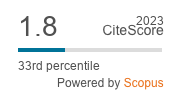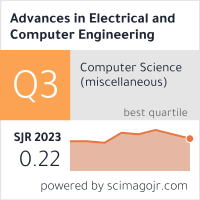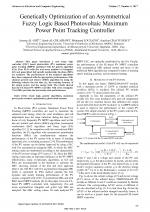| 4/2017 - 9 |
Genetically Optimization of an Asymmetrical Fuzzy Logic Based Photovoltaic Maximum Power Point Tracking ControllerAL-GIZI, A. |
| View the paper record and citations in |
| Click to see author's profile in |
| Download PDF |
Author keywords
fuzzy logic, genetic algorithms, maximum power point trackers, optimization, photovoltaic systems
References keywords
fuzzy(12), tracking(10), logic(10), power(9), point(9), maximum(8), system(7), photovoltaic(7), algorithms(6), systems(5)
Blue keywords are present in both the references section and the paper title.
About this article
Date of Publication: 2017-11-30
Volume 17, Issue 4, Year 2017, On page(s): 69 - 76
ISSN: 1582-7445, e-ISSN: 1844-7600
Digital Object Identifier: 10.4316/AECE.2017.04009
Web of Science Accession Number: 000417674300009
SCOPUS ID: 85035755676
Abstract
This paper introduces a new fuzzy logic controller (FLC) based photovoltaic (PV) maximum power point tracking (MPPT) optimized with the genetic algorithm (GA). Four FLCs with five and seven numbers of triangular (tri) and generalized bell (g-bell) membership functions (MFs) are analyzed. The performances of the analyzed algorithms have been compared with the appropriate performances of the classical perturb and observe (P&O) algorithm by using the following criteria: the rise time (tr), the tracking accuracy of the output power, and the energy yield. The results showed that the FL-based PV MPPT controller with seven triangular (7-tri) MFs provides the best steady-state performances. |
| References | | | Cited By «-- Click to see who has cited this paper |
| [1] S. Saravanan, R. Babu, "Maximum power point tracking algorithms for photovoltaic system- a review," Renewable and Sustainable Energy Reviews, vol. 57, pp. 192-204, 2016. [CrossRef] [Web of Science Times Cited 242] [SCOPUS Times Cited 318] [2] T. M. Mohan, V. Vakula, "Comparative analysis of perturb & observe and fuzzy logic maximum power point tracking techniques for a photovoltaic array under partial shading conditions," Leonardo Journal of Sciences, vol. 27, pp. 1-16, Jul. 2015. [3] A. G. Al-Gizi and S. J. Al-Chlaihawi, "Study of FLC based MPPT in comparison with P&O and InC for PV systems," in Proc. of IEEE International Symposium on Fundamentals of Electrical Engineering (ISFEE 2016), Bucharest, Romania, 2016, pp. 1-6. [CrossRef] [SCOPUS Times Cited 24] [4] A. G. Al-Gizi, "Comparative study of MPPT algorithms under variable resistive load," in Proc. of IEEE International Conference on Applied and Theoretical Electricity (ICATE 2016), Craiova, Romania, 2016, pp. 1-6. [CrossRef] [SCOPUS Times Cited 17] [5] A. M. Othman, M. M. El-Arini, A. Ghitas, A. Fathy, "Realworld maximum power point tracking simulation of PV system based on fuzzy logic control," NRIAG Journal of Astronomy and Geophysics, vol. 1, no. 2, pp. 186-194, 2012. [CrossRef] [6] F. L. Tofoli, D. de Castro Pereira, W. J. de Paula, "Comparative study of maximum power point tracking techniques for photovoltaic systems," International Journal of Photoenergy, vol. 2015, pp. 1-10, Jan. 2015. [CrossRef] [Web of Science Times Cited 35] [SCOPUS Times Cited 65] [7] C. L. Liu, J. H. Chen, Y. H. Liu, Z. Z. Yang, "An asymmetrical fuzzy-logic-control-based MPPT algorithm for photovoltaic systems," Energies, vol. 7, no. 4, pp. 2177-2193, Apr. 2014. [CrossRef] [Web of Science Times Cited 66] [SCOPUS Times Cited 87] [8] P. C. Cheng, B. R. Peng, Y. H. Liu, Y. S. Cheng, J. W. Huang, "Optimization of a fuzzy-logic-control-based MPPT algorithm using the particle swarm optimization technique," Energies, vol. 8, no. 6, pp. 5338-5360, 2015. [CrossRef] [Web of Science Times Cited 87] [SCOPUS Times Cited 130] [9] N. Altin, "Interval type-2 fuzzy logic controller based maximum power point tracking in photovoltaic systems," Advances in Electrical and Computer Engineering, vol. 13, no. 3, pp. 65-70, 2013. [CrossRef] [Full Text] [Web of Science Times Cited 28] [SCOPUS Times Cited 38] [10] A. Durusu, I. Nakir, A. Ajder, R. Ayaz, H. Akca, M. Tanrioven, "Performance comparison of widely used maximum power point tracking algorithms under real environmental conditions," Advances in Electrical and Computer Engineering, vol. 14, no. 3, pp. 89-94, 2014. [CrossRef] [Full Text] [Web of Science Times Cited 10] [SCOPUS Times Cited 12] [11] D. Petreus, D. Moga, A. Rusu, T. Patarau, M. Munteanu, "Photovoltaic system with smart tracking of the optimal working point," Advances in Electrical and Computer Engineering, vol. 10, no. 3, pp. 40-47, 2010. [CrossRef] [Full Text] [Web of Science Times Cited 8] [SCOPUS Times Cited 10] [12] A. Rahma and M. Khemliche, "Combined approach between FLC and PSO to find the best MFs to improve the performance of PV system under variable climate conditions and load requirements," in Proc. of IEEE International Conference on Electrical Sciences and Technologies in Maghreb (CISTEM 2014), Nov. 3-6, 2014, pp. 1-8. [CrossRef] [SCOPUS Times Cited 5] [13] N. Hashim, Z. Salam, and S. M. Ayob, "Maximum power point tracking for stand-alone photovoltaic system using evolutionary programming," in Proc. of IEEE 8th International Power Engineering and Optimization Conference (PEOCO2014), Langkawi, Malaysia, 2014, pp. 7-12. [CrossRef] [SCOPUS Times Cited 19] [14] A. Messai, A. Mellit, A. Guessoum, S. A. Kalogirou, "Maximum power point tracking using a GA optimized fuzzy logic controller and its FPGA implementation," Solar Energy, vol. 85, no. 2, pp. 265-277, 2011. [15] M. T. Guneser, E. Erdil, M. Cernat, T. Ozturk, "Improving the energy management of a solar electric vehicle," Advances in Electrical and Computer Engineering, vol. 15, no. 4, pp. 53-62, 2015. [CrossRef] [Full Text] [Web of Science Times Cited 3] [SCOPUS Times Cited 9] [16] E. Sahin, I. H. Altas, "FPA tuned fuzzy logic controlled synchronous buck converter for a wave/sc energy system," Advances in Electrical and Computer Engineering, vol. 17, no. 1, pp. 39-48, 2017. [CrossRef] [Full Text] [Web of Science Times Cited 4] [SCOPUS Times Cited 8] [17] A. G. Al-Gizi, "Multi-stages for tuning of fuzzy logic controller (FLC) using genetic algorithm (GA)," Eng. & Tech. Journal, vol. 31, no. 6, part A, pp. 1166-1181, 2013. [18] A. G. Al-Gizi, E. A. Hussein, "FPGA-based implementation of genetically tuned fuzzy logic controller (GA-FLC)," Journal of Engineering and Development, vol. 16, no. 3, pp. 241-257, Sep. 2012. [19] S. A. Al-Obaidi, M. N. Al-Tikriti, A. G. Al-Gizi, "Tuning of composite fuzzy logic guidance law using genetic algorithms," Eng. & Tech. Journal, vol. 30, no. 13, pp. 2341-2356, Jan. 2012. [20] F. Herrera, L. Magdalena, "Genetic fuzzy systems: a tutorial," Tatra Mountains Mathematical Publications, vol. 13, pp. 93-121, Jun. 1997. [21] P. Wang, D. P. Kwok, "Optimal design of PID process controllers based on genetic algorithms," Control Eng. Pract., vol. 2, no. 4, pp. 641-648, 1994. [22] J. H. Van der Lee, W. Y. Svrcek, B. R. Young, "A tuning algorithm for model predictive controllers based on genetic algorithms and fuzzy decision making," ISA Trans., vol. 47, no. 1, pp. 53-59, 2008. [23] B. Sarkar, P. Mandal, R. Saha, S. Mookherjee, D. Sanyal, "GA-optimized feed forward-PID tracking control for a rugged electrohydraulic system design," ISA Trans., vol. 52, no. 6, pp. 853-861, 2013. [24] Matlab, Global Optimization Toolbox, "User's Guide (R2015b)," The MathWorks Inc., 2015. Web of Science® Citations for all references: 483 TCR SCOPUS® Citations for all references: 742 TCR Web of Science® Average Citations per reference: 19 ACR SCOPUS® Average Citations per reference: 30 ACR TCR = Total Citations for References / ACR = Average Citations per Reference We introduced in 2010 - for the first time in scientific publishing, the term "References Weight", as a quantitative indication of the quality ... Read more Citations for references updated on 2024-10-21 18:43 in 99 seconds. Note1: Web of Science® is a registered trademark of Clarivate Analytics. Note2: SCOPUS® is a registered trademark of Elsevier B.V. Disclaimer: All queries to the respective databases were made by using the DOI record of every reference (where available). Due to technical problems beyond our control, the information is not always accurate. Please use the CrossRef link to visit the respective publisher site. |
Faculty of Electrical Engineering and Computer Science
Stefan cel Mare University of Suceava, Romania
All rights reserved: Advances in Electrical and Computer Engineering is a registered trademark of the Stefan cel Mare University of Suceava. No part of this publication may be reproduced, stored in a retrieval system, photocopied, recorded or archived, without the written permission from the Editor. When authors submit their papers for publication, they agree that the copyright for their article be transferred to the Faculty of Electrical Engineering and Computer Science, Stefan cel Mare University of Suceava, Romania, if and only if the articles are accepted for publication. The copyright covers the exclusive rights to reproduce and distribute the article, including reprints and translations.
Permission for other use: The copyright owner's consent does not extend to copying for general distribution, for promotion, for creating new works, or for resale. Specific written permission must be obtained from the Editor for such copying. Direct linking to files hosted on this website is strictly prohibited.
Disclaimer: Whilst every effort is made by the publishers and editorial board to see that no inaccurate or misleading data, opinions or statements appear in this journal, they wish to make it clear that all information and opinions formulated in the articles, as well as linguistic accuracy, are the sole responsibility of the author.





